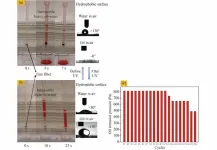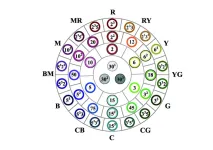(Press-News.org) Party loyalty and partisan motivation may interfere less with Americans’ thinking than previously believed, MIT behavioral researchers Ben M. Tappin, Adam J. Berinsky, and David G. Rand report in new research published in the journal Nature Human Behaviour.
The study, which looked at how Democrats and Republicans react to persuasive messaging that doesn't align with their party leader’s position, challenges the view that party loyalty distorts how Americans process evidence and arguments.
“Our results are clear and unequivocal: Learning the in-party leader’s position on an issue certainly did influence partisans’ attitudes — but it did not cause the partisans to ignore or discount arguments and evidence that ran counter to the leader’s position,” said Rand, the Erwin H. Schell Professor and Professor of Management Science and Brain and Cognitive Sciences at the MIT Sloan School of Management.
Rather, respondents seemed to integrate the leader cues and the countervailing persuasive messages as “independent pieces of information” in determining whether they agreed or disagreed with various policy issues, he said.
Evidence versus cues from the left and right
The study was conducted in September 2021 and more than 5,000 American partisans — Republicans who voted for Donald Trump in 2020 or Democrats who voted for Joe Biden in 2020 — completed a survey spanning 24 policy issues including affirmative action, assisted suicide, the death penalty, estate tax, foreign aid, tariffs on Chinese imports and restrictions at the US border, among others.
In the study, respondents gave their opinions on several of the policy issues on a seven-point scale running from “strongly disagree” to “strongly agree.” Before giving their opinion, they were either shown a cue about the position of their party leader on the issue; a message with arguments and evidence that went against their leader’s position; both the cue and the message; or neither the cue nor the message.
For instance, some respondents were asked whether the military should be allowed to use techniques such as waterboarding to gain information from a suspected terrorist. For those respondents who were Trump-voting Republicans and were assigned to see a persuasive message, they then read a paragraph that cited a 2014 Senate report in which the CIA concluded that such techniques rarely provided reliable intelligence or got suspects to cooperate. The message concluded, “The question then becomes: is it worth violating international law by torturing people — who are effectively innocent until proven guilty by a jury — for mainly useless information? The answer is No. America is better than that.”
This particular example contradicted Trump’s position that such techniques are justified. In 2017, Trump said he believes waterboarding works, stating, "We have to fight fire with fire." Critically, informing respondents that Trump supports waterboarding did not cause them to ignore or discount the persuasive message.
In fact, exposure to the message caused respondents to shift their attitudes towards the message, and this attitude change was a similar size even when they knew that their favored party leader took the opposite position. This pattern of results was consistent across a wide range of policy issues, as well as across demographic groups and different types of partisan cues.
“We found no evidence that countervailing cues from favored party leaders meaningfully diminished partisans’ receptivity to persuasive arguments and evidence — in contrast to what one would expect if party loyalty distorted partisans’ information processing,” said Tappin, a postdoctoral researcher at MIT Sloan and lead author on the study.
“These findings contrast with the notion that party loyalty overrides people’s values and interferes with, distorts, or otherwise limits their processing of counter-partisan messages,” added Rand. “If such interference and distortion does occur, our findings suggest that it is relatively minor, uncommon or may be avoided with ease.”
Not blinded by party loyalty
The authors noted that their results highlight a distinction between two key questions in political psychology: to what extent do party cues influence people’s attitudes, and why do they exert their influence? While there is relative consensus on the first question — party cues reliably influence people’s attitudes, sometimes by a great deal — the second question remains unsettled. Their new paper found that party cues are influential not because of blind loyalty to the party leader, but rather because they contain useful information (which is then weighed against countervailing information).
The range of issues and arguments in the latest study was larger than previous work but, by necessity, still limited; the authors write that different persuasive messages containing alternate arguments and evidence might have produced different results. They also point out that in their study the party leaders’ positions were not supported by justifications and talking points from the partisan media, as they often are in the real world.
The researchers believe that the messages might have worked by appealing to people’s values and identities other than those of their party — and that party loyalty could not override the relevance of these other factors. “People have various identities and motivations that are not reducible to their party,” Tappin concluded.
END
New MIT Sloan research finds Americans are more receptive to counter-partisan messages than previously thought
The study, which looked at how Democrats and Republicans react to persuasive messaging that doesn't align with their party leader’s position, challenges the view that party loyalty distorts how Americans process evidence and arguments.
2023-03-02
ELSE PRESS RELEASES FROM THIS DATE:
Wisconsin cave holds tantalizing clues to ancient climate changes, future shifts
2023-03-02
Even in their dark isolation from the atmosphere above, caves can hold a rich archive of local climate conditions and how they've shifted over the eons. Formed over tens of thousands of years, speleothems — rock formations unique to caves better known as stalagmites and stalactites — hold secrets to the ancient environments from which they formed.
A newly published study of a stalagmite found in a cave in southern Wisconsin reveals previously undetected history of the local climate going back thousands of years. The new findings provide strong ...
Getting drugs across the blood-brain barrier using nanoparticles
2023-03-02
• The blood-brain barrier prevents most drugs from reaching brain tumors.
• A new method using nanoparticles transported drugs across this barrier in mice.
• The nanoparticles target a protein on tumor blood vessel cells called P-selectin.
• The nanoparticles improved the treatment in a model of aggressive pediatric brain cancer
Brain tumors are notoriously hard to treat. One reason is the challenge posed by the blood-brain barrier, a network of blood vessels and tissue with closely spaced cells. The barrier forms a tight seal to protect ...
Insights into the evolution of the sense of fairness
2023-03-02
Göttingen, March 2, 2023. A sense of fairness has long been considered purely human – but animals also react with frustration when they are treated unequally by a person. For instance, a well-known video shows monkeys throwing the offered cucumber at their trainer when a conspecific receives sweet grapes as a reward for the same task. Meanwhile, researchers have observed similarly frustrated reactions to unfair rewards in wolves, rats and crows. However, researchers still debate the reasons for this behavior: Does the frustration really stem from a dislike of unequal treatment, or is there another explanation? In a study with long-tailed ...
Security vulnerabilities detected in drones made by DJI
2023-03-02
Researchers from Bochum and Saarbrücken have detected security vulnerabilities, some of them serious, in several drones made by the manufacturer DJI. These enable users, for example, to change a drone’s serial number or override the mechanisms that allow security authorities to track the drones and their pilots. In special attack scenarios, the drones can even be brought down remotely in flight.
The team headed by Nico Schiller of the Horst Görtz Institute for IT Security at Ruhr University Bochum, ...
Coastal water pollution transfers to the air in sea spray aerosol and reaches people on land
2023-03-02
New research led by Scripps Institution of Oceanography at UC San Diego has confirmed that coastal water pollution transfers to the atmosphere in sea spray aerosol, which can reach people beyond just beachgoers, surfers, and swimmers.
Rainfall in the US-Mexico border region causes complications for wastewater treatment and results in untreated sewage being diverted into the Tijuana River and flowing into the ocean in south Imperial Beach. This input of contaminated water has caused chronic coastal water pollution in Imperial ...
A bridge between hydrophobicity and hydrophilicity of flax fiber: A breakthrough in the multipurpose oil-water separation field
2023-03-02
The large number of oily wastewater discharges and oil spills are bringing about severe threats to environment and human health. Corresponding to this challenge, a number of functional materials have been developed and applied in oil-water separation as oil barriers or oil sorbents. These materials can be divided into two main categories which are artificial and natural.
Natural materials such as green bio-materials are generally low cost and abundant with biological degradability, which are also regarded as promising alternatives for oil-water separation ...
CityU scholars unify color systems using prime numbers
2023-03-02
Existing colour systems, such as RGB and CYMK, are all text-based and require a large range of values to represent different colours, making them difficult to compute and time-consuming to convert. Recently, researchers from City University of Hong Kong (CityU) made a breakthrough by inventing an innovative colour system, called “C235”, based on prime numbers, enabling efficient encoding and effective colour compression. It can unify existing colour systems and has the potential to be applied in various applications, like designing an energy-saving LCD system and colourizing DNA codons.
Currently, ...
UCD Archaeologist receives prestigious Dan David Prize for research on the invisible workforce behind ancient forms of art
2023-03-02
The Dan David Prize, the largest history prize in the world, has announced University College Dublin (UCD) Archaeologist, Dr Anita Radini, as one of nine recipients for 2023.
Each of the winners - who work in Kenya, Denmark, Israel, Canada, the US and Ireland - will receive $300,000 (USD) in recognition of their achievements as emerging scholars and to support their future endeavours in the study of the human past. Dr Radini is the first in Ireland to receive this award.
“Our winners represent the next generation of historians,” said Ariel ...
Putting a price tag on the amenity value of private forests
2023-03-02
When it comes to venturing into and enjoying nature, forests are the people’s top choice – at least in Denmark. This is also reflected in the sales prices of properties with private forest. But beyond earnings potential, this first study of its kind, conducted by the University of Copenhagen, puts a price tag on the so-called amenity value of Danish private forests.
Forests have a nearly therapeutic effect on humans. Perhaps that is why eight out of ten of Danes have wandered in the woods over ...
The map to human and animal behavior
2023-03-02
What are humans? What are animals? And what makes humans unique? The comparative psychologist Fumihiro Kano has set himself a life goal to answer those questions. On 28 February 2023 it was announced that the scientist from the Cluster of Excellence “Centre for the Advanced Study of Collective Behaviour” (CASCB) at the University of Konstanz will receive the Manfred Fuchs Prize from the Heidelberg Academy of Sciences and Humanities of the State Baden-Württemberg for his interdisciplinary work in animal behaviour research.
Photo gallery for the article: https://www.campus.uni-konstanz.de/en/science/the-map-to-human-behaviour
Fumihiro ...
LAST 30 PRESS RELEASES:
Study finds early imaging after pediatric UTIs may do more harm than good
UC San Diego Health joins national research for maternal-fetal care
New biomarker predicts chemotherapy response in triple-negative breast cancer
Treatment algorithms featured in Brain Trauma Foundation’s update of guidelines for care of patients with penetrating traumatic brain injury
Over 40% of musicians experience tinnitus; hearing loss and hyperacusis also significantly elevated
Artificial intelligence predicts colorectal cancer risk in ulcerative colitis patients
Mayo Clinic installs first magnetic nanoparticle hyperthermia system for cancer research in the US
Calibr-Skaggs and Kainomyx launch collaboration to pioneer novel malaria treatments
JAX-NYSCF Collaborative and GSK announce collaboration to advance translational models for neurodegenerative disease research
Classifying pediatric brain tumors by liquid biopsy using artificial intelligence
Insilico Medicine initiates AI driven collaboration with leading global cancer center to identify novel targets for gastroesophageal cancers
Immunotherapy plus chemotherapy before surgery shows promise for pancreatic cancer
A “smart fluid” you can reconfigure with temperature
New research suggests myopia is driven by how we use our eyes indoors
Scientists develop first-of-its-kind antibody to block Epstein Barr virus
With the right prompts, AI chatbots analyze big data accurately
Leisure-time physical activity and cancer mortality among cancer survivors
Chronic kidney disease severity and risk of cognitive impairment
Research highlights from the first Multidisciplinary Radiopharmaceutical Therapy Symposium
New guidelines from NCCN detail fundamental differences in cancer in children compared to adults
Four NYU faculty win Sloan Foundation research fellowships
Personal perception of body movement changes when using robotic prosthetics
Study shows brain responses to wildlife images can forecast online engagement — and could help conservation messaging
Extreme heat and drought at flowering could put future wheat harvests at risk
Harlequin ichthyosis: a comprehensive review of pathogenesis, diagnosis, and management
Smithsonian planetary scientists discover recent tectonic activity on the Moon
Government censorship of Chinese chatbots
Incorporating a robotic leg into one’s body image
Brain imaging reveals how wildlife photos open donor wallets
Wiley to expand Advanced Portfolio
[Press-News.org] New MIT Sloan research finds Americans are more receptive to counter-partisan messages than previously thoughtThe study, which looked at how Democrats and Republicans react to persuasive messaging that doesn't align with their party leader’s position, challenges the view that party loyalty distorts how Americans process evidence and arguments.







